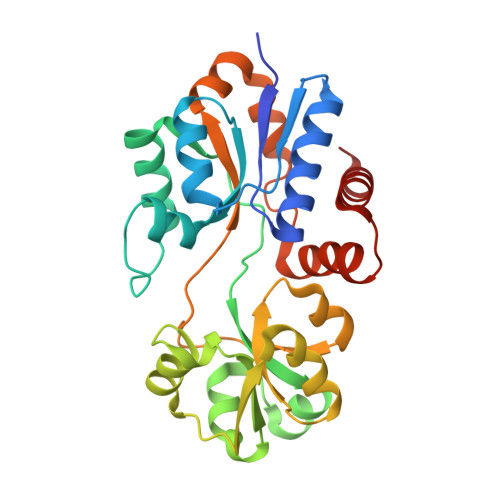A microbial transporter of the dietary antioxidant ergothioneine.
Dumitrescu, D.G., Gordon, E.M., Kovalyova, Y., Seminara, A.B., Duncan-Lowey, B., Forster, E.R., Zhou, W., Booth, C.J., Shen, A., Kranzusch, P.J., Hatzios, S.K.(2022) Cell 185: 4526-4540.e18
- PubMed: 36347253
- DOI: https://doi.org/10.1016/j.cell.2022.10.008
- Primary Citation of Related Structures:
8DP6, 8DP7 - PubMed Abstract:
Low-molecular-weight (LMW) thiols are small-molecule antioxidants required for the maintenance of intracellular redox homeostasis. However, many host-associated microbes, including the gastric pathogen Helicobacter pylori, unexpectedly lack LMW-thiol biosynthetic pathways. Using reactivity-guided metabolomics, we identified the unusual LMW thiol ergothioneine (EGT) in H. pylori. Dietary EGT accumulates to millimolar levels in human tissues and has been broadly implicated in mitigating disease risk. Although certain microorganisms synthesize EGT, we discovered that H. pylori acquires this LMW thiol from the host environment using a highly selective ATP-binding cassette transporter-EgtUV. EgtUV confers a competitive colonization advantage in vivo and is widely conserved in gastrointestinal microbes. Furthermore, we found that human fecal bacteria metabolize EGT, which may contribute to production of the disease-associated metabolite trimethylamine N-oxide. Collectively, our findings illustrate a previously unappreciated mechanism of microbial redox regulation in the gut and suggest that inter-kingdom competition for dietary EGT may broadly impact human health.
- Department of Molecular, Cellular, and Developmental Biology, Yale University, New Haven, CT 06520, USA; Department of Chemistry, Yale University, New Haven, CT 06520, USA; Microbial Sciences Institute, Yale University, West Haven, CT 06516, USA.
Organizational Affiliation:

















